Tommerup’s Dairy Farm: How a 20-cow Queensland milking herd turns a tidy profit
A sixth-generation farming family has proved the “get bigger or get out” mantra is not the only way to build a thriving dairy business.
Queensland dairy farmer Kay Tommerup has been asked the question countless times: How can her family possibly survive on milking just 20 cows?
She’s pretty proud of the answer: “We deliver an exceptional product,” she says.
Kay and her husband, Dave, run a diverse operation across 80ha at Kerry, in Queensland’s Scenic Rim south of Brisbane.
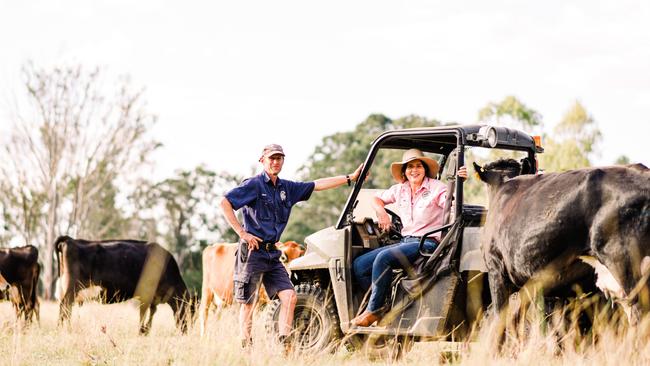
Their business centres on a small herd of 20 Jersey cows, commanding maximum value for every drop of milk by transforming it into a range of premium products in an on-farm creamery.
They also run free-range heritage breed pigs, raise bobby calves for veal and have a flock of egg-laying pastured chooks.
In about 2008, the Tommerups added agritourism to the mix, frequently hosting on-farm events to reconnect consumers to where their food comes from, welcoming school groups, running farm tours, managing farm-stay accommodation and selling their produce through an on-farm “larder” shop.
Kay said people usually assumed “it must be the tourism” that kept Tommerup’s Dairy Farm going.
“It is really great to be able to say, ‘no, that isn’t the way it happens’,” she said. “All the parts of our business work together to make us profitable and none would work without the other.
“The tourism side definitely feeds into the success of the farm because that is how we market ourselves, but we no longer rely on that income to keep us afloat.
“It is really interesting to look at how our business is going now, compared to five years ago. Our turnover on the farm has reduced, but our profit is much, much greater.”
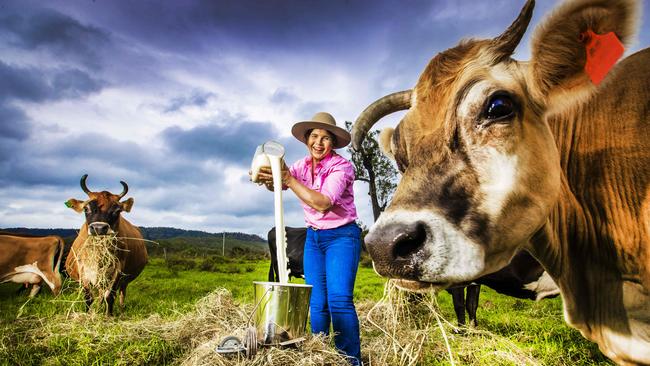
TURNING POINT
The most recent chapter of the Tommerup family’s farming story started in 2006, when Kay and Dave took over the property from Dave’s parents. The farm has been in his family since 1874.
Previously, the two families had managed the property together, running about 100 cows and supplying Norco.
“But things started to fall apart here in 2000, when deregulation of the dairy industry came in … and income more than halved overnight,” Kay said. “We had this terrible six years of trying to make something happen and trying to make it work. None of those things worked very well.”
So Kay and Dave started making drastic changes after they took the reins.
Most significantly they cut their herd by half, down to about 45 cows, and decided to focus on quality rather than quantity.
While still supplying the co-op for a time, they started to investigate value-adding opportunities and made a plan to launch their own brand, while also importantly diversifying with other livestock and revenue streams.
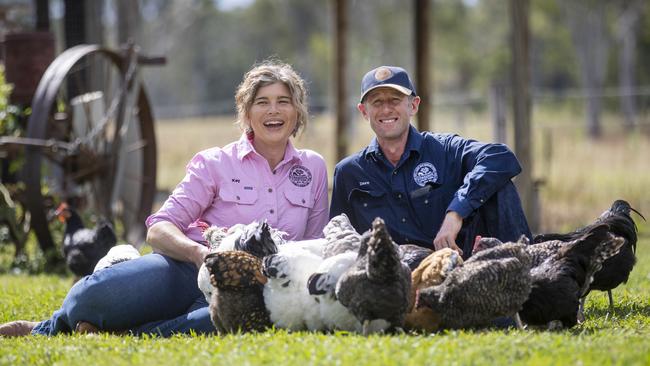
Importantly, they also kept debt levels low.
“Everybody told us we should just get out because we were too small to survive,” Kay says.
“That made us even more determined to keep going. You shouldn’t have to be a certain size or fit a certain box to do what you love.”
They faced propping up the dairy part of the business through agritourism and meat sales for a number of years, but when they opened their on-farm creamery in 2018, things started to turn a corner.
“Our dairy business was making a loss and we had to find other ways to keep our business going,” Kay said. “It’s only in the past couple of years since we’ve gone out on our own that we’ve been able to get the dairy to a point where it is adding profit to our business structure.”
Their Jersey Girl dairy range has grown to include cultured butter, buttermilk, yoghurt, crème fraiche, cream-top milk and ice cream, selling to high-end restaurants and directly to consumers through their on-farm shop.
When the drought really started to bite, they again decreased to 20 milkers, and now have no plans to increase the herd.
Their small herd has also offered advantages during this year’s wet weather.
“Having less cows, we had no cases of mastitis across all of the wet, when everyone was talking about it being so boggy,” Kay said. “We were able to keep the cows really healthy during that period.”
Their business plan hinges on making sure everything grown and raised on the property contributes to the business in a big way.
They feed surplus milk to their 50 heritage breed pigs to produce “milk-fed” pork. Bobby calves are raised with their mothers until about two months of age, then grazed on pasture to about 10 months of age, when they are processed for veal. Retired dairy cows are processed for beef.
The flock of 900 pastured chooks (managed by Kay’s nephew, Tom) produces high quality eggs while also fertilising paddocks.
TASTE THE DIFFERENCE
While building a following for their brand, the family continued to supply milk to Norco.
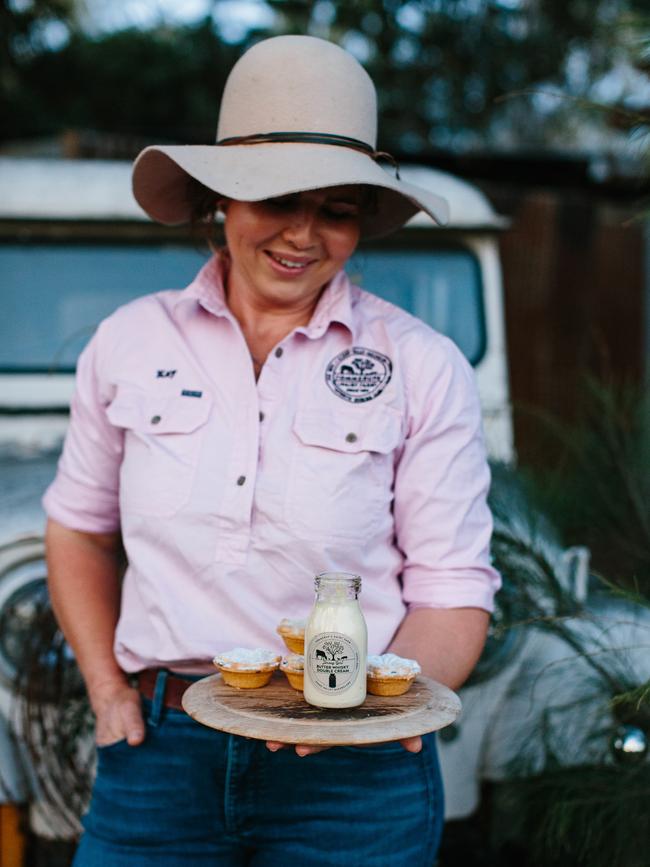
In January 2021, they finally made the bold leap to stop supplying the co-op. Today, while sales of milk and milk products are down 35 per cent compared with 2018, profit is more than four times greater and all milk is now used in the creamery or on the farm.
“The hardest decision to make was the actually stepping away from the security of supplying a processor,” Kay said. “We understood that we were taking a big risk at that point.
“We felt we were at a point where we had developed enough of a reputation and people associated our brand with quality, that we had a chance to move out on our own.
“Perhaps it is not something (customers) choose to purchase all the time, but they do purchase it enough for this to be a sustainable business.”
Their products command a premium. A 130g block of their award-winning salted, cultured butter, for example, sells for $11, while one litre of Farmer Dave’s Cream Top Milk (promised to be “liquid gold”) has a $5 price tag.
Customers are happy to pay for the taste experience.
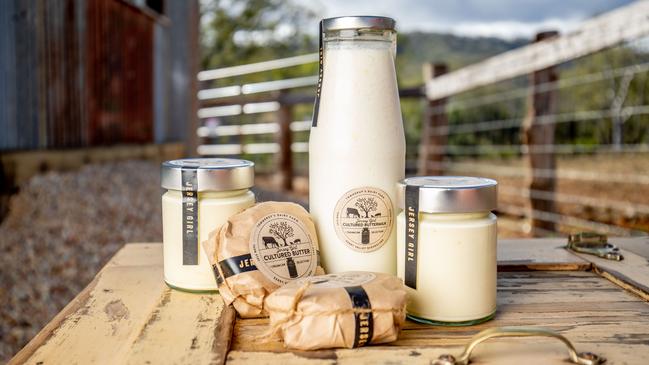
Kay and Dave believe the loyalty they have built is down to their meticulous approach to feeding and raising their animals, as well as how they manufacture the products.
“There is definitely a lot more work involved in us processing it ourselves and making sure the quality stays at a level we are happy with,” Kay said. “Keeping it small has been the answer.
“I often say to my husband, when we are thinking of new products, is if we are not making an exceptional product in that range, I have no interest in playing in that space.”
Dave manages the dairy, while Kay is in charge of production in the creamery.
“I’m a bit of a control freak,” she said. “If I’m not here, or if we take time off, it doesn’t get done. It’s as simple as that.
“So I have to make sure the other parts of our business can sustain the times when we aren’t processing dairy and the milk isn’t wasted. That’s where the milk-fed pork comes into its own.”
Milk is pasteurised on the day, and cream is stored for next-day butter production.
An on-farm lab allows Kay to test for any traces of bacteria, to ensure all products are safe for consumption.
Pork and veal is processed by a butcher, with the couple looking to eventually butcher their own meat. And in the future, goat meat and fresh cheese are on the cards.
ON THE GROUND
Agritourism is definitely an important part of the Tommerups’ business.
Early on in their solo farming journey, Kay and Dave started welcoming visitors from the city on to their property to reconnect with how food was produced, and things snowballed from there.
“Realising how much city people really enjoy the experience … it encouraged us to branch out to let people come to the farm more,” she said.
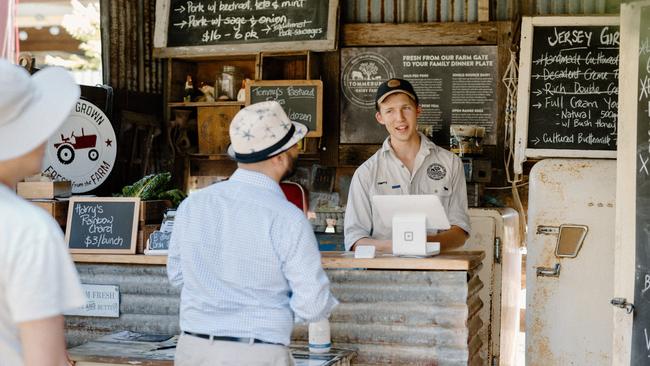
They host school groups, tours and market days, with Kay holding a position the board of local tourism group Destination Scenic Rim for 10 years.
She also helped spearhead the Scenic Rim Farm Gate Trail series of events, which kicked off in 2021.
These days Kay concentrates on her roles on the eastAUSmilk board and Queensland Farmers Federation board.
“I want to see farming continue to be a valued part of our society, and I think there will be many challenges faced by our industry as we work towards the climate targets being set,” she said.
In their paddocks, the Tommerups manage pasture as naturally as possible, avoiding herbicides and chemical fertilisers, instead using seaweed preparations and livestock manures.
Animal health is a top priority for the couple, but they avoid antibiotics if possible.
“I guess we look after our animals a bit the way we’ve raised our kids,” Kay said. “If you really need to go to the doctor we’ll take you, but we try to do everything we can to make sure you are healthy enough that we don’t have to.”
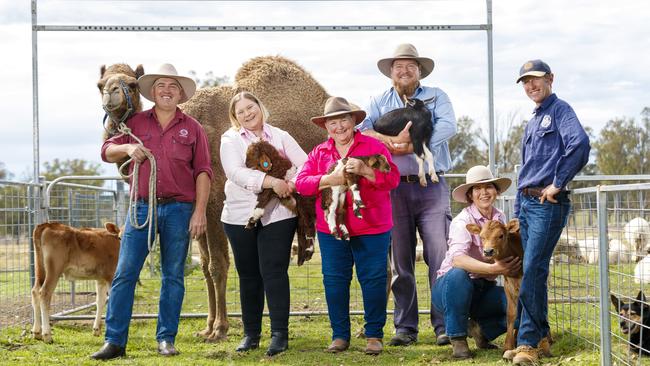
They feed cows less than 2kg of locally grown grain a day, mixing kelp meal into the ration, which helps animals deal with heat stress.
Despite recent challenges including fuel price increases and the cost-of-living crunch, Kay said demand remained strong and their focus remained on quality.
“The end product is really important to us,” she said. “And the very first thing (that affects quality) I guess is the condition of our land and health of our animals.
“That is something that we really believe is a big part of our success.
“By giving the customer a better understanding of what farmers do, they feel more connected to the end product they’re consuming.
“After all, if you consume food, you’re part of the food chain and have to accept some responsibility for the way it’s produced. Often the only way that city folk can do that is by ensuring they are paying a fair price.”




